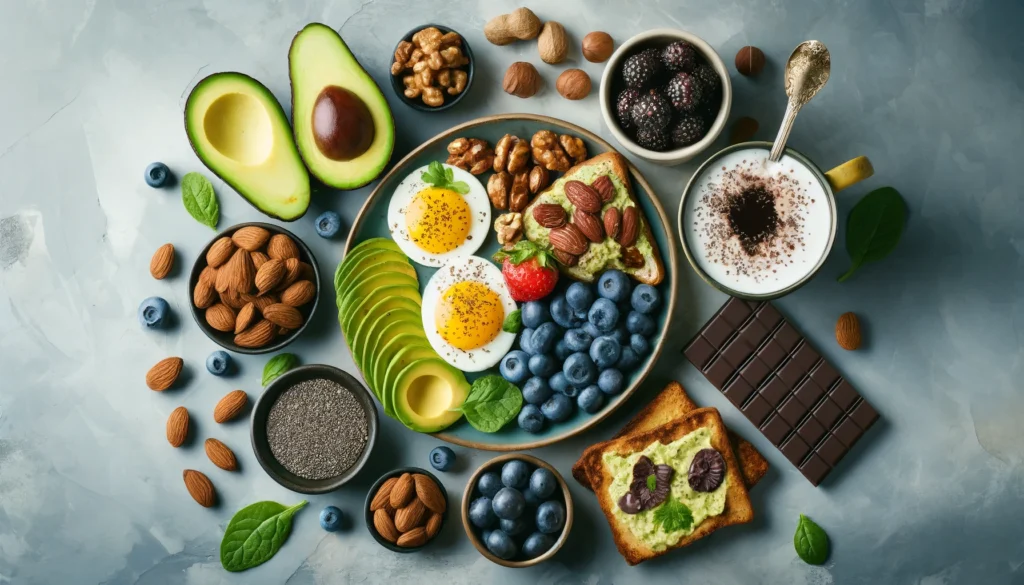The Role of Nutrition in Brain Function and Cognitive Health
Cognitive function is deeply influenced by the foods we consume, making diet a critical component of memory retention and mental performance. The brain, like any other organ, requires essential nutrients to operate at its peak, ensuring clarity, focus, and overall cognitive agility. Foods that improve memory contain antioxidants, healthy fats, and essential vitamins that protect neurons and enhance neurotransmitter efficiency. Studies show that a balanced diet for brain health can significantly reduce cognitive decline and improve mental performance in both the short and long term. By integrating the best brain food supplements and nutrient-rich foods, individuals can optimize their brain function, supporting lifelong cognitive health.
You may also like: How to Increase Brain Cells Naturally: Strengthening Neural Pathways for Optimal Memory & Recall
Foods That Help with Memory and Enhance Brain Performance
Memory-enhancing foods provide essential nutrients that support neural connectivity, reduce inflammation, and promote optimal brain function. Nuts, particularly walnuts and almonds, are considered powerful brain improvement foods due to their high levels of vitamin E and omega-3 fatty acids. Blueberries, rich in antioxidants, help protect the brain from oxidative stress, which can accelerate cognitive decline. Leafy greens such as spinach and kale are abundant in folate and vitamin K, both of which contribute to improved memory and neural regeneration. A well-rounded diet that includes these foods for memory is fundamental to maintaining mental sharpness and cognitive resilience over time.
The Science Behind Brain Food Supplements and Cognitive Function
For individuals looking to enhance memory and mental clarity beyond their daily diet, brain food supplements provide additional cognitive benefits. Omega-3 fatty acids, commonly found in fish oil supplements, have been widely researched for their role in improving memory and reducing neuroinflammation. B-vitamin complexes, particularly B6, B9 (folate), and B12, support neurotransmitter function and protect against age-related cognitive decline. Adaptogens such as ashwagandha and Rhodiola rosea have also been linked to increased mental resilience and reduced brain fog. When selecting a food supplement for memory, it is essential to prioritize high-quality, research-backed ingredients to ensure efficacy and safety.
How to Improve Memory Through Diet and Lifestyle Changes
Memory enhancement is not solely dependent on the consumption of specific foods but also on overall dietary patterns and lifestyle choices. The Mediterranean diet, which emphasizes whole grains, healthy fats, and lean proteins, has been consistently associated with better cognitive function and reduced risk of Alzheimer’s disease. Hydration is another crucial factor, as dehydration can impair short-term memory and concentration. Regular exercise and mindfulness practices such as meditation further support brain function by improving circulation and reducing stress. Implementing these strategies alongside consuming foods that boost memory ensures a comprehensive approach to cognitive wellness.

Foods That Promote Focus and Increase Mental Stamina
Maintaining focus throughout the day requires a steady supply of brain-boosting nutrients that support energy metabolism and neurotransmitter activity. Foods that help you focus include fatty fish, dark chocolate, and green tea, all of which contain compounds that enhance concentration and mental alertness. Whole grains, such as quinoa and oats, provide sustained energy release, preventing blood sugar crashes that can lead to cognitive fatigue. Additionally, nuts brain food varieties, including cashews and pistachios, contain essential minerals like magnesium that contribute to improved brain connectivity. By integrating these foods to eat to improve memory, individuals can maintain sharper focus and better information retention.
The Best Cereals for Memory and Cognitive Support
Breakfast plays a vital role in setting the stage for cognitive function throughout the day. The best cereals for memory include those rich in fiber, whole grains, and essential nutrients. Oats, for example, provide steady glucose release, ensuring sustained brain energy without sudden spikes or crashes. Fortified cereals containing B vitamins and iron help improve concentration and cognitive endurance. Chia seeds and flaxseeds, when added to cereal, contribute to omega-3 intake, further enhancing brain function. Choosing nutrient-dense cereals ensures a strong foundation for mental clarity and productivity.
Foods Good for the Brain: A Comprehensive List
Compiling a brain foods list provides a structured approach to selecting the most beneficial foods for cognitive health. Some of the most effective foods to boost memory include:
- Fatty fish (salmon, sardines) – Rich in omega-3 fatty acids for neural health.
- Berries (blueberries, strawberries) – High in antioxidants that protect against oxidative stress.
- Leafy greens (spinach, kale) – Packed with folate and vitamin K to support memory retention.
- Nuts and seeds (walnuts, flaxseeds) – Excellent sources of healthy fats and vitamin E.
- Eggs – Provide choline, essential for neurotransmitter production.
- Dark chocolate – Contains flavonoids and caffeine that enhance concentration.
- Whole grains (quinoa, brown rice) – Help stabilize blood sugar for sustained focus. Each of these foods supports various aspects of cognitive function, making them integral to a brain-boosting diet.
What Drinks Help with Memory Loss and Cognitive Decline?
While food plays a primary role in cognitive enhancement, certain beverages contribute to brain health by providing hydration and essential nutrients. Green tea is widely recognized for its brain-boosting properties, thanks to its high levels of L-theanine and caffeine, which promote focus and relaxation simultaneously. Coffee, in moderation, can improve alertness and reaction time due to its caffeine content. Hydrating beverages like coconut water help maintain electrolyte balance, preventing cognitive fatigue. Herbal teas, such as ginkgo biloba and turmeric-infused drinks, have shown promise in supporting brain function and reducing inflammation. Consuming these beverages alongside a nutritious diet amplifies the benefits of brain food for memory.
The Connection Between Nutrition and Brain Function in Aging Adults
As individuals age, cognitive function naturally declines, making diet an essential component of brain longevity. Brain foods for seniors should prioritize anti-inflammatory and neuroprotective compounds to counteract age-related cognitive deterioration. Foods such as turmeric, rich in curcumin, and dark leafy greens help slow memory decline and maintain cognitive resilience. Foods good for the brain, including nuts and fatty fish, play a preventive role against neurodegenerative conditions such as dementia. Implementing a well-structured diet for brain health can significantly improve quality of life and long-term mental acuity.

Frequently Asked Questions (FAQ) on Brain Boosting Foods and Supplements
1. How do brain food supplements compare to whole foods in improving memory?
Brain food supplements can be beneficial for individuals who struggle to get essential nutrients from their diet. While whole foods such as berries, nuts, and fatty fish provide a range of nutrients that support cognitive function, supplements can offer concentrated doses of specific compounds like omega-3 fatty acids, B vitamins, and antioxidants. The best brain food supplements should complement a well-balanced diet rather than replace it. Consuming both whole foods and high-quality supplements can provide a more comprehensive approach to brain health. However, supplements should be taken with guidance from a healthcare provider to ensure proper dosage and avoid potential interactions.
2. What are the best foods to eat to improve memory and concentration?
Foods to eat to improve memory and focus should include a combination of healthy fats, antioxidants, and essential vitamins. Fatty fish such as salmon and mackerel are rich in omega-3 fatty acids, which support neural function. Leafy greens like spinach and kale contain vitamin K and folate, both of which contribute to cognitive longevity. Nuts brain food options, including almonds and walnuts, provide vitamin E, which helps protect against cognitive decline. Whole grains and berries also play a role in enhancing memory by improving blood flow to the brain and reducing inflammation.
3. How can I improve my short-term memory through diet and lifestyle changes?
Short-term memory can be enhanced by consuming brain boosting foods, maintaining regular physical activity, and practicing cognitive exercises. Foods that improve memory include eggs, which contain choline essential for neurotransmitter function, and pumpkin seeds, which provide magnesium and zinc that enhance brain signaling. Staying hydrated is also critical, as dehydration can lead to cognitive sluggishness. Practicing mindfulness techniques such as meditation and engaging in puzzles or memory training exercises can further strengthen short-term recall. Combining a nutrient-rich diet with mental stimulation ensures better cognitive resilience.
4. What are some of the best cereals for memory enhancement?
The best cereals for memory are those that contain whole grains, fiber, and essential nutrients that sustain brain function. Fortified cereals with B vitamins, iron, and omega-3s provide necessary building blocks for cognitive performance. Oats, quinoa, and bran-based cereals help stabilize blood sugar levels, preventing energy crashes that can impair concentration. Adding nuts or seeds to cereal enhances its brain-boosting potential by supplying additional healthy fats and antioxidants. Avoiding heavily processed cereals with excess sugar is crucial, as they can lead to mental fatigue and reduced alertness.
5. Are there specific drinks that help with memory loss and cognitive function?
Yes, certain beverages can enhance memory and overall cognitive function. Green tea contains L-theanine and antioxidants that promote mental clarity and relaxation without the jitters associated with coffee. Blueberry juice, rich in flavonoids, has been shown to improve memory retention and protect neurons from oxidative stress. Hydration with plain water is also essential, as dehydration negatively impacts focus and short-term memory. Turmeric-infused drinks can reduce inflammation in the brain, supporting cognitive longevity. Choosing nutrient-dense drinks alongside brain-boosting foods helps sustain long-term mental clarity.
6. How can I naturally increase memorization ability through food choices?
To naturally increase memorization, incorporating foods to boost memory into daily meals is crucial. Avocados provide healthy fats that improve blood flow to the brain, while dark chocolate contains flavonoids that enhance neural connectivity. Seeds such as flaxseeds and sunflower seeds supply essential minerals like magnesium, which play a role in memory formation. A well-balanced diet for brain health should include lean proteins, fiber-rich vegetables, and foods that help the brain function optimally. Consistency in consuming these nutrient-dense foods leads to sustained cognitive improvement.
7. What are some ways to improve memory besides diet?
While a nutritious food for brain approach is fundamental, there are additional ways to improve memory. Engaging in activities that challenge the brain, such as learning a new language or playing musical instruments, strengthens neural connections. Regular physical activity, particularly aerobic exercises, increases oxygen flow to the brain and reduces cognitive decline. Adequate sleep is essential for memory consolidation, as deep sleep stages allow the brain to process and store information effectively. Stress management through meditation, yoga, or deep-breathing exercises can further support cognitive function and memory retention.
8. Is there any product that boosts memory significantly, or are results gradual?
Many brain improvement food products and supplements claim to enhance memory, but results are typically gradual rather than immediate. The best brain food supplements containing omega-3s, ginkgo biloba, and phosphatidylserine can improve cognitive function over time with consistent use. However, no single product can replace a well-balanced diet and a healthy lifestyle. Results vary depending on factors such as genetics, diet, sleep quality, and physical activity levels. Long-term commitment to brain-healthy habits is the most effective way to see sustained cognitive benefits.
9. What are some good foods for brain health that support long-term cognitive function?
Good foods for brain health include a variety of nutrient-dense options that provide essential vitamins and minerals. Cruciferous vegetables like broccoli and Brussels sprouts are rich in antioxidants that combat oxidative stress. Legumes such as lentils and chickpeas offer plant-based protein and folate, which support neurotransmitter balance. Whole grains like brown rice and barley stabilize energy levels and prevent cognitive fatigue. A diverse, whole-food diet ensures that the brain receives a wide range of nutrients necessary for optimal function and longevity.
10. What are some brain foods for seniors that help prevent cognitive decline?
Brain foods for seniors should focus on anti-inflammatory and neuroprotective properties. Foods that help with memory in aging individuals include turmeric, known for its curcumin content that fights inflammation, and fatty fish, which provides DHA essential for cognitive preservation. Berries, rich in antioxidants, have been shown to slow memory decline in older adults. Leafy greens, along with nuts and seeds, provide vitamins and minerals necessary for maintaining mental sharpness. By combining these foods with an active and mentally engaging lifestyle, seniors can support long-term brain health and reduce the risk of neurodegenerative diseases.

Conclusion: Optimizing Brain Health Through Nutrition and Supplements
A holistic approach to cognitive wellness combines the right dietary choices with strategic supplementation to ensure long-term brain health. By consuming brain boosting foods and integrating the best brain food supplements, individuals can enhance memory retention, increase focus, and reduce cognitive decline. Understanding the relationship between food for brain health and mental clarity allows for informed dietary decisions that support both immediate and long-term cognitive function. Whether through nutrient-dense meals, smart snacking choices, or hydration-focused beverages, prioritizing nutrition remains one of the most effective ways to improve brain function. Adopting these dietary principles ensures a well-nourished, high-performing mind capable of adapting to the cognitive demands of modern life.
Further Reading:
The 14 best foods to boost brain health and memory
12 foods to boost brain function
Best Foods for A Healthy Brain and Improved Memory
Important Note: The information contained in this article is for general informational purposes only, and should not be construed as health or medical advice, nor is it intended to diagnose, prevent, treat, or cure any disease or health condition. Before embarking on any diet, fitness regimen, or program of nutritional supplementation, it is advisable to consult your healthcare professional in order to determine its safety and probable efficacy in terms of your individual state of health.
Regarding Nutritional Supplements Or Other Non-Prescription Health Products: If any nutritional supplements or other non-prescription health products are mentioned in the foregoing article, any claims or statements made about them have not been evaluated by the U.S. Food and Drug Administration, and such nutritional supplements or other health products are not intended to diagnose, treat, cure, or prevent any disease.


